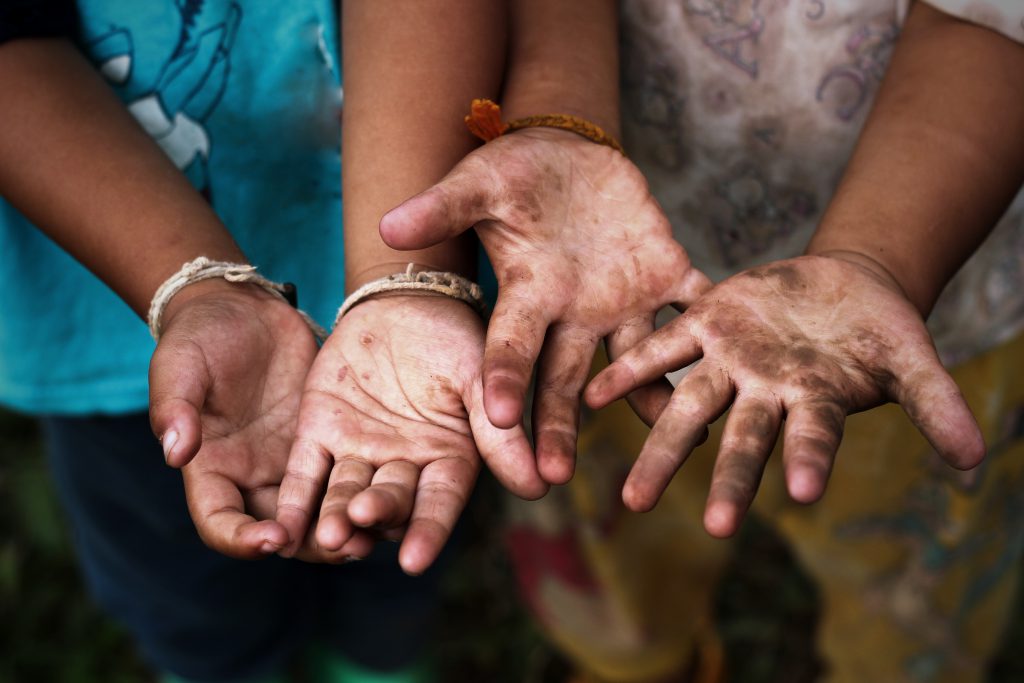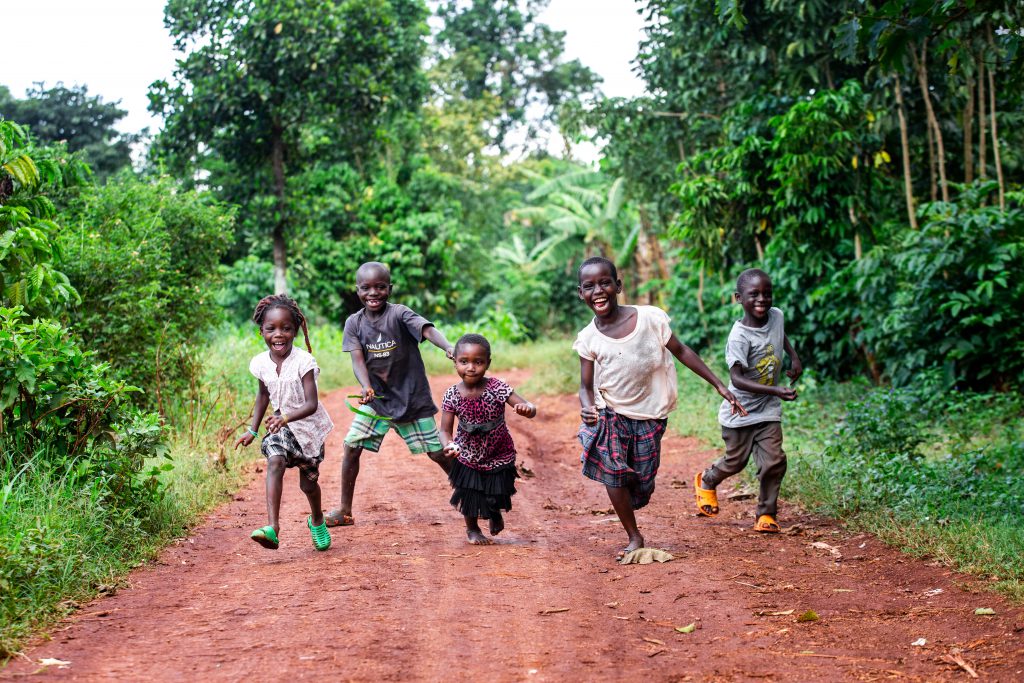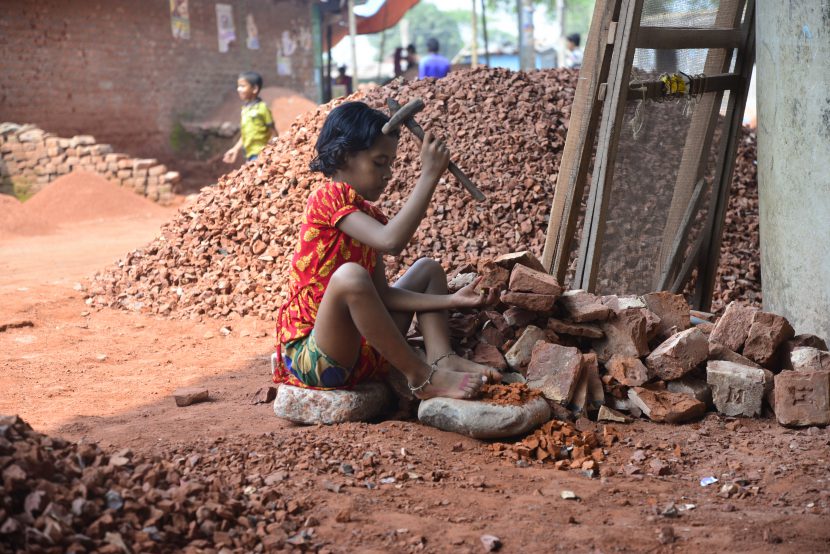“From pesticide poisoning in Brazil to child exploitation in Tanzania’s gold mines, children’s rights are violated at the bottom of global supply chains” Maike Röttger, National Director of Plan International Germany
– Maike Röttger, National Director of Plan International
While globalization has brought new opportunities and benefits to economies and people around the globe, it also tends to leave the most vulnerable in society behind. Children are at particular risk of rights abuses committed in or as the result of international business operations in developing countries. Business and human rights is no longer a marginal topic – but can global supply chain laws effectively contribute to the protection of children’s and human rights?
The Covid-19 pandemic: child labor on the rise
Children around the world are systematically involved in paid and unpaid forms of work. Child labor, however, becomes problematic when children are too young to work or engaged in dangerous and exploitative activities. This in turn harms their physical, mental, social or educational development, thus limiting their future opportunities.
As the Covid-19 pandemic is ravaging the world – causing school closures and a significant rise in poverty – more and more children are pushed into workforce. The latest global estimates indicate that around one in ten children, ages 5 to 17, are involved in labor that is regarded detrimental to their health and development. Since the pandemic started another 9 million children are at risk of child labor(Unicef, 2021).
Governments have been regarded as the natural duty bearers for respecting, protecting and fulfilling children’s rights and hence ending child labor around the globe. However, the focus today is increasingly turning to the responsibility of companies and their obligations to respect human and children’s rights in their global supply chains. Since the early 2000s the issue of human rights and business started to receive bigger public attention among the international community, followed by the adoption of a series of voluntary guidelines, recommendations and laws, encouraging businesses to align their operations with universal human rights.
Global supply chains: addressing business impacts on children’s rights
Economic globalization has provided numerous opportunities, while also creating new challenges, including in the field of children’s rights protection. Before a product is being distributed to the final buyer it often transits through multiple processes, countries and continents for the purpose of sourcing and supplying goods and services: clothes come from Asia, cocoa and fruit from Africa, coffee from South America. This circle is referred to as the global supply chain (CIPS).
The recent history of global supply chains, however, contains abundant examples of children’s rights abuses directly committed by transnational companies or occurring as a result of their business operations. Within global supply chains a significant share of child labor frequently takes place during the first stages, in activities such as raw material extraction and agriculture.
Too often, businesses are taking advantage of looser legal frameworks and an insufficient access to justice in development countries. In this context, boys and girls are repeatedly exposed to hazardous work conditions, including environmental pollution (such as illegal deforestation, pesticide emissions, water and air pollution), lack of health and safety measures and the violation of the most basic labor rights (Much L. , 2021).
Can international supply chain laws lead towards a responsible business model?
In 2011, the UN adopted the, so called, UN Guiding Principles on Business and Human Rights (UNGPs), a set of guidelines for States and companies to prevent, address and remedy human rights abuses committed in business operations. These guidelines ought to provide clear steps for companies on how to incorporate human rights standards into their business practices and supply chains (OHCHR, 2011).
Following the adoption of the UNGPs, the responsibility to respect human rights, including children’s rights, is seen as a global standard of expected conduct for all business enterprise wherever they operate. Most importantly, it exists independently of States’ abilities or willingness to fulfill their own human rights obligations. The implementation of the UNGPs is promoted by individual governments through national action plans (OHCHR, 2011).
Although the adoption of the UNGPs marked a decisive step forward by introducing principles that, nowadays, enjoy quasi-universal recognition, business-related human rights abuses are still a serious problem. The non-binding character of the UNGPs and the lack of a central mechanism to ensure their implementation are frequently criticized by civil society actors, international organizations and governments (EU-Parliament, Towards a binding international treaty on business and human rights, 2018).
European supply chain laws: those who act globally must take global responsibility

The dissatisfaction with the shortcoming of the UNGPs and their slow and ineffective implementation have driven the discussions to draft a binding international treaty. At the same time, regional and national legal instruments are being developed with the aim to provide for stronger legal foundations when it comes to protecting human and children’s rights in business operations.
On the European level, the 27 EU-member states unanimously adopted in December 2020 the Council Conclusions on “Human Rights and Good Work in Global Supply Chains.” In March 2021, the European Parliament adopted a legislative initiative report on corporate due diligence and accountability. The EU Commission now plans to present a concrete directive proposal for sustainable corporate governance by the end of 2021, which will also include corporate due diligence obligations along global supply chains (BMAS, Bundesministerium für Arbeit und Soziales, 2021).
However, individual legal instruments already exist. These include for example the EU’s Non-Financial Reporting Directive (Directive 2014/95/EU), which entered into force in 2014 and provides obligations for companies operating abroad to disclose their compliance inter alia with human rights norms. Another legislative initiative imposing due diligence obligations on EU companies is the recently adopted Conflict Minerals Regulation.
Since 1 January 2021, importers of four minerals (tin, tantalum, tungsten and gold) are obliged to check the likelihood that the raw materials could be financing conflict or could have been extracted using forced labor (EU-Parliament, Towards a mandatory EU system of due diligence for supply chains, 2021).
In addition to the progress made at EU level many EU-member states are already implementing due diligence laws. In the Netherlands, for instance, the Due Diligence Act (nl.: “Wet Zorgplicht Kinderarbeid”)addressing, in particular, child labor in the global supply chain has been in place since 2019. It obliges companies, selling on the Dutch market, to verify if child labor takes place in their supply chains. Companies that fail to comply can be fined(BMAS, Bundesministerium für Arbeit und Soziales, 2021).
Similarly, France introduced in 2017 a due diligence law (fr. “Loi de la vigilance”) which requires French companies with more than 5000 employees worldwide to implement and publish a, so called, vigilance plan. This plan is intended to identify the risk of serious violations of human rights, health and safety of persons and environmental degradation within a supply chain. Companies refusing to meet their obligations are liable and must take remedial action (BMAS, Bundesministerium für Arbeit und Soziales, 2021).
In Germany, the parliament recently passed a law on corporate due diligence in supply chains (dt. “Lieferkettengesetz”). Passed on 11 June 2021, it is the first time that the responsibility of German companies for respecting human rights in global supply chains has been made binding. Starting from 2023, companies with more than 1000 employees have to analyze human rights risks, take preventive and remedial action, establish mechanisms to obtain redress and report on their activities(Deutsche Bundesregierung, 2021).
How can we protect children’s rights in the business world?
Human rights abuses committed in or as the result of business operations particularly endanger children, as they are just at the beginning of their physical and mental development. Indeed, child labor, the exposure to environmental pollution or harmful substances, harsh working conditions and the lack of school education have a much more destructive and long term impact on children.(Much L. (., 2021).
In the context of the before mentioned preparation of the German law on due diligence in supply chains, a law that would adequately protect children’s rights in the global business has been actively advocated for. In a common position paper, international children’s rights organizations raised, in particular, the importance for a law that would treat children as a particularly vulnerable group with their own rights as enshrined in the UN Convention on the Rights of the Child, but also introduces grievance mechanisms accessible and adapted to young workers (Much L. , 2021).
While national and international supply chain laws and guidelines regulating corporate due diligence obligations can certainly be deemed as a step and signal in the right direction, time will prove if they will set the frame for a more effective fight for children and human rights around the globe.

With just a few clicks, you can make a big difference to end child labor around the world. Discover how to stand up for children’s rights, join our community, interact with our work, and spread the word through our website, Facebook page or newsletter! You want to take action? Your donation will support Humanium’s vital work to advance children’s rights and to improve their well-being worldwide.
Written by Anja Finke
Bibliography:
CIPS. Global Supply Chains. Abgerufen am 24. July 2021
OHCHR. (2011). Guiding Principles on Business and Human Rights. Abgerufen am 21. July 2021


